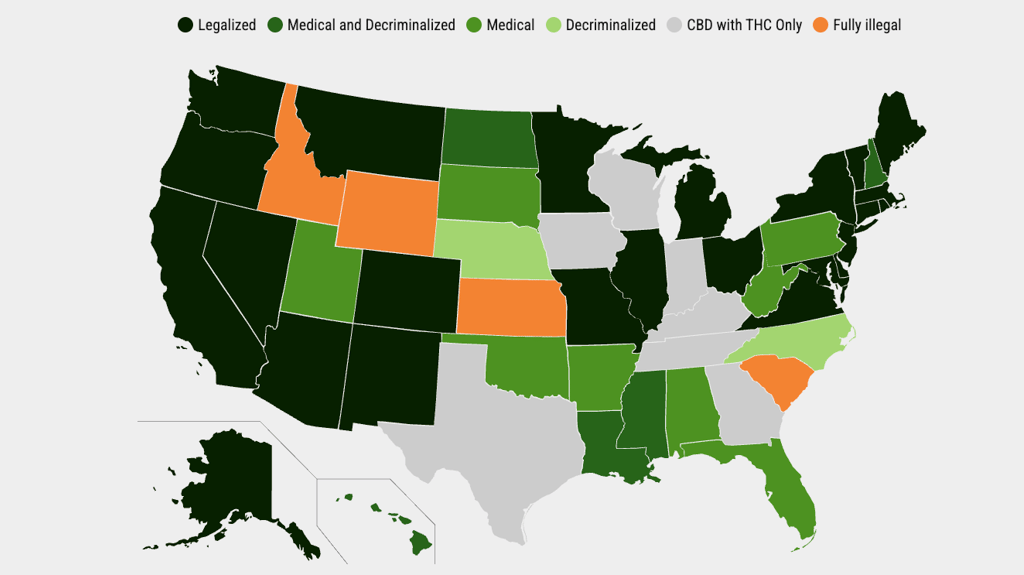Cannabis Legalization by State: Comprehensive Legal Status Guide for 2025
This guide examines cannabis legalization across all 50 states, explaining six legal categories from full legalization to prohibition. It clarifies how hemp-derived THC and CBD products remain federally legal under the 2018 Farm Bill, enabling interstate commerce even in restrictive states like Wisconsin, while providing practical compliance insights for consumers and businesses.
Tom Panos
3 min read
The cannabis legal landscape continues evolving rapidly across the United States, creating a complex patchwork of regulations that affects consumers, businesses, and interstate commerce. As of May 2025, state marijuana laws vary significantly, ranging from full legalization to complete prohibition, with multiple intermediate categories that reflect differing approaches to medical access, decriminalization, and hemp-derived products.
Current Legal Framework Categories
State cannabis laws currently fall into six distinct classifications that determine product availability and consumer access rights. Full legalization permits both medical and recreational use with regulated commercial markets. Medical and decriminalized status combines therapeutic access with reduced penalties for personal use. Medical-only states restrict cannabis to qualified patients with specific conditions.
Decriminalized states have eliminated criminal penalties for possession while maintaining civil fines. CBD with THC-only jurisdictions permit limited cannabinoid products with restricted THC content. Fully illegal states maintain comprehensive prohibition with criminal penalties.
The distinction between these categories significantly impacts product accessibility and legal protections for consumers seeking cannabis-based wellness solutions.
Hemp-Derived Products: Federal vs. State Authority
The 2018 Farm Bill established federal legality for hemp-derived products containing less than 0.3% Delta-9 THC by dry weight. This federal framework creates opportunities for hemp-derived Delta-8 THC, Delta-9 THC gummies, and CBD products to operate in states without traditional marijuana programs.
Hemp-derived cannabinoids exist in a regulatory space separate from state marijuana laws, though some states have enacted specific restrictions on these products. The federal hemp framework enables interstate commerce for compliant products, allowing companies to serve customers across state lines where local laws permit.
This distinction proves particularly relevant for consumers in restrictive states who can access federally legal hemp-derived alternatives that provide similar therapeutic and recreational benefits.
Wisconsin and Regional Considerations
Wisconsin maintains restrictive cannabis laws while permitting hemp-derived products under federal guidelines. The state's position reflects broader Midwest trends where agricultural hemp production coexists with conservative marijuana policies. Wisconsin residents can legally purchase hemp-derived Delta-8 THC, Delta-9 THC gummies, and CBD products from licensed retailers.
Neighboring states present varying approaches that influence regional markets. Illinois offers full legalization with robust recreational programs. Michigan permits comprehensive medical and recreational use. Minnesota has implemented limited recreational access alongside medical programs.
These regional differences create compliance challenges for businesses serving multiple jurisdictions while highlighting the economic opportunities presented by consistent hemp-derived product availability.
Interstate Commerce and Shipping Considerations
Federal hemp legality enables nationwide shipping for compliant products, though businesses must navigate individual state restrictions and local regulations. Companies shipping hemp-derived products typically verify recipient age and location to ensure compliance with destination laws.
State-specific limitations may include THC potency caps, product type restrictions, or age verification requirements that exceed federal minimums. Some states explicitly prohibit certain hemp-derived cannabinoids despite federal legality, creating enforcement conflicts between state and federal authority.
Successful interstate commerce requires comprehensive compliance programs that account for destination state laws while maintaining federal hemp standards.
Future Trends and Legislative Developments
Cannabis legalization momentum continues building across multiple states, with legislative sessions regularly producing new medical programs, decriminalization measures, and recreational frameworks. Banking reform and federal scheduling changes remain under consideration, potentially reshaping the industry's regulatory environment.
Hemp-derived product regulations face increasing scrutiny as state lawmakers seek to address products that circumvent traditional marijuana restrictions. Some jurisdictions are implementing age limits, potency caps, and licensing requirements for hemp-derived cannabinoids.
The trend toward broader acceptance suggests continued expansion of legal access, though implementation timelines and specific regulations vary significantly by jurisdiction.
Compliance and Consumer Protection
The evolving legal landscape emphasizes the importance of third-party testing, accurate labeling, and transparent business practices. Consumers benefit from purchasing from licensed retailers that provide certificates of analysis and comply with applicable regulations.
State tracking systems, product testing requirements, and labeling standards create consumer protection frameworks that ensure product safety and potency accuracy. These regulatory structures support market confidence while protecting public health.
Understanding applicable laws helps consumers make informed decisions about product selection and purchase locations while supporting businesses that prioritize compliance and quality assurance.
Cannabis legalization continues progressing nationwide, creating expanded access opportunities while requiring careful attention to jurisdiction-specific regulations. Hemp-derived products provide federally legal alternatives that serve consumers across diverse legal environments, supporting the broader movement toward comprehensive cannabis policy reform and evidence-based regulation.




